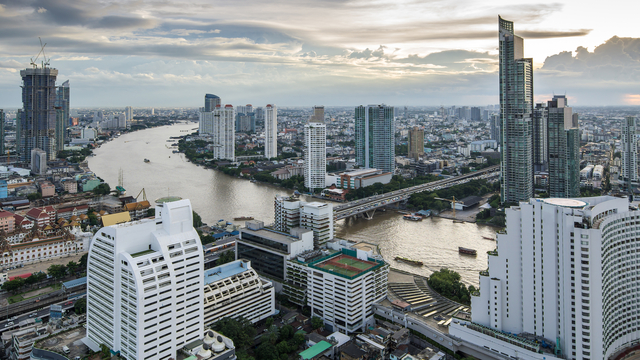Letters to Shareholders are included in the Seafarer Funds’ Annual and Semi-annual Reports. The Reports are available in the Archives.
May 2023 – Annual Report

Lydia So explains that the current environment presents opportunities to invest in durable businesses that can consolidate and gain market share, as less competitive companies either fail or retreat from markets. She describes the characteristics she seeks in growth securities.
Letter to ShareholdersNovember 2022 – Semi-annual Report

In light of volatile markets and changing sentiment towards China, Nicholas Borst reports that Seafarer will continue to “seek truth through facts” when investing in China, through thorough analysis of corporate earnings, balance sheets, and governance structures.
Letter to ShareholdersMay 2022 – Annual Report

To mark the tenth anniversary of the Seafarer Overseas Growth and Income Fund, Seafarer’s founders reflect on the Fund’s historical record and progress toward its investment objectives during a challenging decade for the emerging markets.
Letter to ShareholdersNovember 2021 – Semi-annual Report

Paul Espinosa writes that, despite the past decade of modest EM corporate earnings growth, Seafarer finds opportunities in the form of strengthened balance sheets (retained earnings) and improved corporate governance (higher dividends).
Letter to ShareholdersMay 2021 – Annual Report

As China’s economic might is ever more fraught with political and moral dilemmas, Andrew Foster weighs the merits of carving out China as an independent asset class.
Letter to ShareholdersNovember 2020 – Semi-annual Report

Kate Jaquet discusses how Seafarer’s team has adapted to remote work this year. She describes two risks in China that she is closely monitoring: indebted property developers and the troubled banking sector. Lastly, Kate explains that accelerated digitalization and evolving capital markets create investment opportunities in the developing world for the long-term investor.
Letter to ShareholdersMay 2020 – Annual Report

Daniel Duncan offers a perspective on the volatile market environment and explains why he believes most developed market investors can benefit from the diversification offered by investing in the emerging markets. He cautions that while the initial Covid-19-related panic in global capital markets may be over, there could be significant negative economic and market events to come.
Letter to ShareholdersNovember 2019 – Semi-annual Report

Paul Espinosa describes how Seafarer’s active, bottom-up investment strategies address a challenge faced by the Funds’ shareholders and by Seafarer: ever-decreasing rates of return on capital. Paul explains that Seafarer continues to derive investment returns from individual companies that display specific Growth and Income or Value characteristics – not from characteristics that relate to geography or sector.
Letter to ShareholdersMay 2019 – Annual Report

Michelle Foster and Nicholas Borst reflect on the three-year anniversary of the Value Fund. The Fund aims to exploit certain long-term structural changes in the developing world – changes that Seafarer believes will force various companies to realize a portion of the value that is embedded in their balance sheets. In addition, Michelle and Nicholas explain that amid ongoing volatility and uncertainties in emerging markets, Seafarer continues to invest in personnel and resources to better serve the Funds.
Letter to ShareholdersNovember 2018 – Semi-annual Report

Andrew Foster explains that despite unsatisfactory performance, he believes the emerging markets still warrant long-term investment, chiefly because of their potential to decouple from the investment cycle of the developed world. Andrew asserts that current U.S. trade policy will push China toward greater economic independence, and the pace of transformation will likely surprise observers. When the transition is complete, the emerging markets will follow a new and differentiated investment cycle, with China at their center.
Letter to ShareholdersMay 2018 – Annual Report

Andrew Foster states that despite his concerns over China’s increasingly centralized government control, the country’s growing economic scale and global prominence mean that it cannot be ignored in an investor’s portfolio. In his view, investors must consider a substantial, structural increase in their exposure to China – through dedicated allocation to a broad array of asset classes. Andrew also notes the Growth and Income Fund’s reduction in operating expenses, consistent with Seafarer’s long-term goals.
Letter to ShareholdersNovember 2017 – Semi-annual Report
Andrew Foster offers a personal perspective on recent events in China, within the context of the country’s long-term evolution. Andrew explains that when Xi Jinping assumed the Presidency in 2012, his administration presented a bold plan to undertake economic reform and unlock new growth potential. However, the plan has fallen short over the past five years: reform has largely stalled while Xi consolidated political power. Meanwhile, the economy has remained reliant on excessive credit expansion to stimulate growth. Andrew expresses concern as to whether China will reach its potential.
Letter to ShareholdersMay 2017 – Annual Report
Andrew Foster notes the Growth and Income Fund’s reduction in operating expenses, consistent with Seafarer’s long-term goals. Next, he discusses Seafarer’s policy on corporate governance. The policy emphasizes the use of objective data to measure each company’s impact on society and nature, and it requires that Seafarer assess the consequences for valuation and growth. Andrew explains how the policy favors engagement over divestment: Seafarer believes that acting as a responsible steward of capital means encouraging companies to enhance their standards and practices. Lastly, he declares that the policy is not a marketing gimmick, but rather an intrinsic element of the firm’s philosophy and process.
Letter to ShareholdersNovember 2016 – Semi-annual Report
Andrew Foster reviews recent developments with the Funds and the Adviser. He discusses the launch of the Seafarer Overseas Value Fund, noting that its strategy is focused on a traditional form of value investing – adapted for the particular challenges inherent to the emerging markets – and as such it embodies an evolution in Seafarer’s investment philosophy. Andrew also addresses the recent closure of the Growth and Income Fund to most new investors, and the intention behind the closure – to ensure that the Fund has adequate capacity to serve existing shareholders’ needs, both in the present and in the future.
Letter to ShareholdersMay 2016 – Annual Report
Andrew Foster reviews the Growth and Income Fund’s performance over the past year. Andrew explains how in the first half of the fiscal year, a “mini-bubble” in Chinese stocks popped, and dragged the Fund lower. However, in the second half of the year, a politically driven rally in Brazil’s currency and shares offset some of the Fund’s losses. Yet Andrew notes with frustration that, despite the second half recovery, the Fund finished the year with material losses, though its performance since inception is positive. Andrew concludes by reflecting on the future of Seafarer Capital Partners, touching upon the firm’s plans for scale, strategies, team and culture.
Letter to ShareholdersNovember 2015 – Semi-annual Report
Andrew Foster discusses the challenging environment that impacted both the Growth and Income Fund and the benchmark index over the summer. He cites two factors that weighed on performance: currency losses (led by the Brazilian Real) and a sharp correction in Chinese stocks. Andrew then addresses an important, albeit contentious topic: whether the emerging market asset class is “dead,” as suggested by some analysts. He reviews the main criticisms that surround the category, and then offers his own view on the future of the asset class. Andrew concludes by discussing some of the latest developments at Seafarer Capital Partners, the firm that advises the Fund.
Letter to ShareholdersMay 2015 – Annual Report
Andrew Foster discusses the performance of the Growth and Income Fund during the fiscal year, which is perhaps best described as “a tale of two halves.” He reflects on recent events within China, and urges investors to carefully observe the country’s economic transition, regardless of their views about the country’s investment merit. Next, Andrew provides data on the three-year performance record of the Fund, and places that record in some context versus the Fund’s stated investment objectives. He concludes by introducing Seafarer’s efforts to embrace new modes of communication with existing and prospective shareholders.
Letter to ShareholdersNovember 2014 – Semi-annual Report
Andrew Foster discusses the performance of the Growth and Income Fund and the emerging markets over the past six months. He describes a structural change that has begun to transform the investment landscape within the developing world: the rise of “value.” Andrew believes “value” will be an important feature of investment in the emerging world for the decade to come. He concludes by offering some updates on Seafarer Capital Partners, including the recent expense reduction on the Fund, and the introduction of new team members at the firm.
Letter to ShareholdersMay 2014 – Annual Report
Andrew Foster reflects on the numerous shocks that weighed upon the emerging markets during the past year. Despite such challenges, stock prices were remarkably resilient; Andrew asserts this was because equities in the developing world were (and are) inexpensive. During a year beset by many troubles, China was the most worrisome market of all. Andrew acknowledges his concerns, but encourages shareholders to peer over the “great wall of worry.” The Middle Kingdom is engaged in a sweeping set of economic reforms that have the potential to put the country on an improved path. The final section of the letter includes announcements of interest to shareholders.
Letter to ShareholdersNovember 2013 – Semi-annual Report
Andrew Foster discusses the lackluster performance of the emerging markets this year. He suggests that time and perspective are essential to put the markets in proper context: important structural changes are underway, but progress is difficult to perceive – change proceeds slowly, in fits and starts. Andrew concludes with a discussion of “WYSIATI,” an acronym coined by Daniel Kahneman. WYSIATI describes a fallacy that impairs decision-making, and Andrew believes it is relevant to investors: prevailing indices used to track emerging markets might obscure as much as they reveal. Andrew suggests time and perspective are required to overcome any WYSIATI perception bias.
Letter to ShareholdersMay 2013 – Annual Report
Andrew Foster offers a retrospective on the Growth and Income Fund’s performance over its first complete fiscal year. He then discusses the merits of Seafarer’s investment approach, which is practiced “from the bottom up.” He concludes with a brief outlook for the emerging markets. A number of major “macro” issues may cloud the picture (as always), but Andrew believes there are plenty of prospective investments that satisfy the risk and return criteria the Fund seeks, and thus he is an enthusiastic investor.
Letter to ShareholdersNovember 2012 – Semi-annual Report
Andrew Foster discusses several topics, beginning with valuations in emerging markets, which he describes as broadly fair. Next, he offers his thoughts on changes in China’s growth model and how the service sector is likely to be at the forefront of the transition. Andrew notes, however, two areas where China may falter: he’s worried about the possibility of military conflict, but he’s even more concerned about the country’s leadership. He sees some signs that it is growing more ideologically rigid at a time when flexibility is paramount. Lastly, Andrew offers a few comments about Seafarer’s progress to date.
Letter to ShareholdersMay 2012 – Annual Report
In Seafarer’s inaugural letter to shareholders, Lead Portfolio Manager Andrew Foster discusses his outlook for the Growth and Income Fund; his views on China’s slowing growth and Europe’s woes; valuations on emerging market stocks; the importance of perspective and persistence amid today’s frenetic markets; and his goals for Seafarer and the Fund.
Letter to Shareholders![[Chrome]](/_layout/images/ua/chrome.png)
![[Firefox]](/_layout/images/ua/firefox.png)
![[Opera]](/_layout/images/ua/opera.png)
![[Microsoft Edge]](/_layout/images/ua/edge.png)